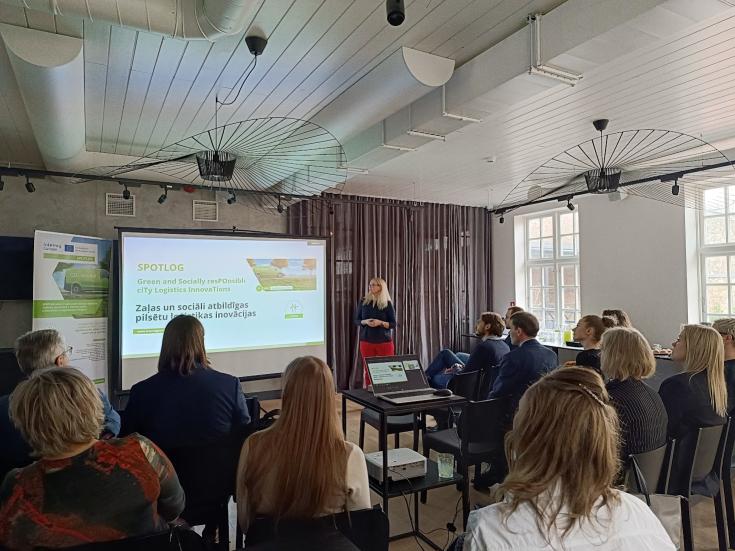Last mile delivery in the rural areas and cities in Vidzeme

Representatives from the goods delivery industry, local government specialists, and scientific research institutions met on February 23, 2024, in Cēsis for the second stakeholder meeting to discuss the challenges of last-mile delivery in urban and rural areas of Vidzeme.
SPOTLOG project and its best practices were highly valued by the attendees as they received valuable information on how local companies and scientific institutions have adapted their delivery systems to cater to the specific requirements of their location. The discussions that followed were aimed at exploring the scalability and implementation of these solutions in Vidzeme. The event organizers were thrilled to witness the active and high-quality discussions between the business and research sectors.
In the presentation, the project expert, Zane Pīpkalēja, outlined the purpose and main activities of SPOTLOG. The project's primary concern was strongly emphasized, and stakeholders were informed about the available opportunities to participate actively in future project activities. The expert reported examples of successful last mile solutions in Rimini, Pilava and Gdynia, both in urban and remote areas.
A representative from the transport company, DPD Latvia, presented a study on e-commerce trends in 2023. According to the study, 64% of Latvian residents shop online, with 45% of them being regular customers who shop several times a month. The statistical data reveals that the number of online store customers increased significantly during the Covid pandemic, and these habits have become more entrenched since the pandemic's end. Free shipping is a crucial factor that influences the purchasing decision of buyers. According to the research findings, 69% of the participants still prefer receiving their purchases through a parcel locker, which is the most popular way of delivery. DPD Latvia’s current fleet consists of 39 electric buses, and they have built 40 charging points to support them. The company has made a commitment to serve Riga and its surroundings exclusively with electric buses until 2030. However, it is important to note that electric buses are suitable for short distances and can be affected by outside temperatures. The delivery transport is equipped with air quality measurement sensors that collect data and send it to the municipality for daily analysis.
Valērijs Skribans, the representative of Riga Technical University, shared information about environmentally-friendly transportation solutions and the ongoing TRANS4ECO project. Skribans emphasized that it will be prohibited to produce cars with traditional internal combustion engines from 2035, and steps must be taken to transition to alternative fuel sources. The discussions are increasingly focusing on hydrogen as an alternative fuel, especially in freight transport.
Ilze Lukstiņa, a researcher from Riga Technical University, has explained the difference between a smart city, a smart municipality, and a smart village. She emphasized the importance of the last one in improving the community's quality of life, which positively affects the provision of last-mile delivery services. In the cooperation model, the local government serves as an intermediary for technology transfer, which is essential in solving problems. It's important to note that innovations are needs-based solutions that can only be created through collaboration. She shared information about the RAPTOR initiative, allowing any city to submit its mobility challenge and receive offers from innovative companies that could help solve the problem.
Dropshipping services are becoming more advanced due to growing demand, allowing companies to specialize in offering various services. Armands from SmartPost Itella spoke about parcel lockers that are situated indoors, ensuring a constant temperature at which goods are stored. The company's primary focus is on developing infrastructure in areas where residents have no other options. The most significant challenge is finding suitable premises to place the parcel lockers.
Meanwhile, the IzziPizi delivery company is primarily focused on providing parcel lockers that are ideal for delivering different food products to customers. They use a crowdsourcing system where various companies that meet the necessary technical requirements for safe transportation of food products are involved in the transportation process.
According to the participants of the event, it is not often that such gatherings are organized in the transport industry. Therefore, many of the industry's leading companies were present at the event. They not only presented their operating principles and revealed challenges but also engaged in discussions with one another. This created a sense of confidence that competitors are capable of finding common ground and offering each other advice and support.